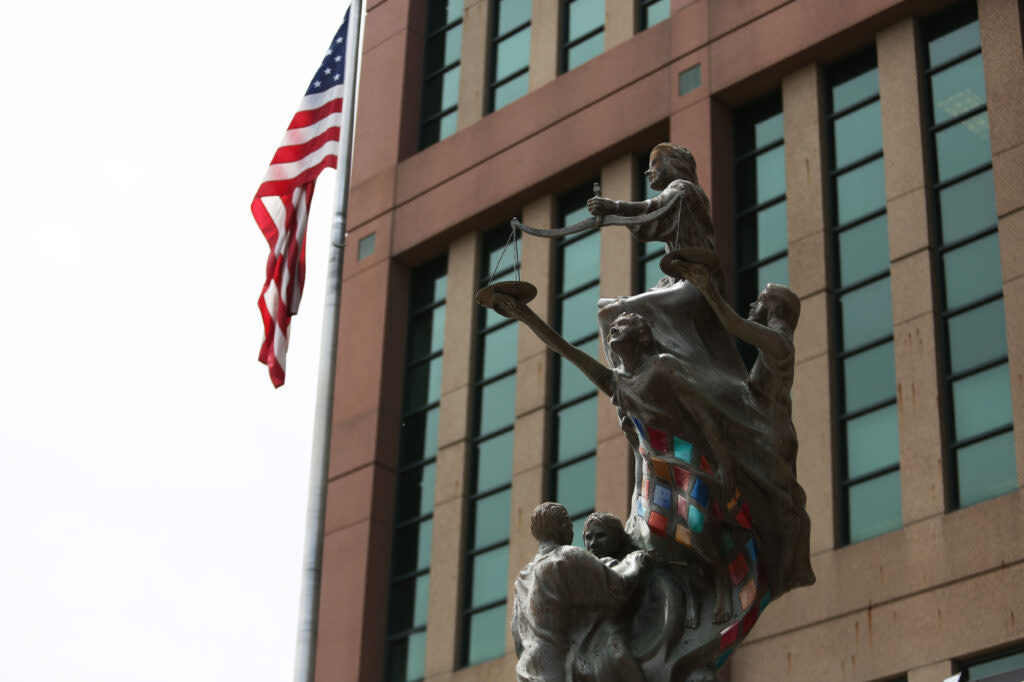Explaining the lawsuit against South Dakota’s abortion-rights ballot measure

An equal justice statue stands outside the doors of the Minnehaha County Courthouse in Sioux Falls. (Makenzie Huber/South Dakota Searchlight)
A new court fight over South Dakota’s abortion-rights ballot measure could hinge on a complicated answer to a simple question: Does a set of six-year-old petition requirements still exist?
The court fight started Thursday, when the Life Defense Fund filed a lawsuit in state court. The lawsuit challenges the legitimacy of a citizen-initiated Nov. 5 ballot question that would reinstate abortion rights. The Life Defense Fund is a ballot question committee organized to oppose the measure.
Dakotans for Health is the ballot question committee that supports the measure and gathered the petition signatures to put it on the ballot. Instead of filing a response in state court, Dakotans for Health asked a federal judge on Tuesday to intervene on its behalf. To understand why, it’s necessary to retrace a series of legislative and court battles dating to 2018.
That’s when the Republican-dominated Legislature enacted restrictions on the petition process that citizens use to place measures on the ballot. The restrictions were intended to prevent non-South Dakotans from circulating petitions, in part by requiring petitioners to provide information proving their South Dakota residency.
One year later, in 2019, some lawmakers said out-of-state petitioners were circumventing the law. So the Legislature repealed part of the 2018 law and replaced it with a new law. Among other things, the 2019 law required all petition circulators to publicly disclose personal information including their address, email and phone number.
A ballot question committee, SD Voice, and a liberal blogger, Cory Heidelberger, successfully sued to block the 2019 law. They said the law violated their First Amendment free speech rights, had a chilling effect on petition circulators, and imposed “unwarranted new restrictions on the ballot measure process, for the purpose of further consolidating power in South Dakota’s dominant political party.”
In 2020, legislators responded with another new law applying similar requirements, but only to paid petition circulators. Dakotans for Health successfully sued to block that law. A federal appellate judge in the case wrote, “While South Dakota has important interests in protecting the integrity of the ballot initiative process, it has no interest in enforcing overbroad restrictions that likely violate the Constitution.”
Both the 2019 and 2020 laws included a 30-day residency requirement for petition circulators. That specific requirement was challenged in yet another lawsuit, filed by the League of Women Voters. The league agreed to drop its narrower lawsuit when Dakotans for Health succeeded with its wider suit.
According to the Life Defense Fund, the end result of all that lawmaking and litigating is that the original 2018 law still stands. It’s still “good law,” the group claims, because none of the subsequent bills that sought to repeal or amend it are currently in force. Those bills were challenged by opponents and blocked by the courts.
The Life Defense Fund therefore asserts that the abortion-rights petitioners were obligated to comply with the 2018 law, which requires sworn statements including information proving the petitioners’ South Dakota residency. The Life Defense Fund says Dakotans for Health failed to obey that law, and “therefore the entire petition is disqualified.”
Dakotans for Health says the Life Defense Fund lawsuit is an illegal attempt to resurrect the 30-day residency requirement for petitioners and “flout” the related court decisions. That’s why Dakotans for Health is asking a federal judge to prevent any state court from enforcing the residency requirement.
There are other allegations in the Life Defense Fund lawsuit: petition circulators failed to provide a required handout to signers, some signatures were counted as valid even though they’d been crossed out on the petition, some signers didn’t list the county where they’re registered to vote, some signers were allegedly duped into thinking they were signing a petition about repealing the sales tax on groceries, and so on.
“This will be proven by witness testimony,” Sara Frankenstein, the attorney for the Life Defense Fund, told South Dakota Searchlight.
Dakotans for Health, represented by attorney Jim Leach, asserts that the Life Defense Fund’s other allegations are insufficient to achieve its aim of removing the abortion-rights measure from the ballot. The petition circulator residency questions are “critical to the possible success” of the lawsuit, Dakotans for Health says in its federal court memorandum.
Nancy Turbak Berry, a Democratic former legislator who leads a coalition advocating for the ballot measure, panned the Life Defense Fund’s legal strategy.
“It is a press release masquerading as a lawsuit, designed solely to allow the opponents of reproductive freedom to peddle more inflammatory lies,” she said.
Dakotans for Health filed its ballot petition in May with about 55,000 signatures. The Secretary of State’s Office validated the petition after sampling the signatures and estimating that 46,098 of them were from South Dakota registered voters — more than the 35,017 needed to qualify for the ballot.
Abortions are currently banned in South Dakota, except to “preserve the life of the pregnant female.” The ballot measure would legalize abortions in the first trimester of pregnancy but allow the state to impose limited regulations in the second trimester and a ban in the third trimester, with exceptions for the life and health of the mother.
South Dakota Searchlight’s Joshua Haiar contributed to this report.
GET THE MORNING HEADLINES DELIVERED TO YOUR INBOX SUPPORT NEWS YOU TRUST.
The post Explaining the lawsuit against South Dakota’s abortion-rights ballot measure appeared first on South Dakota Searchlight.

